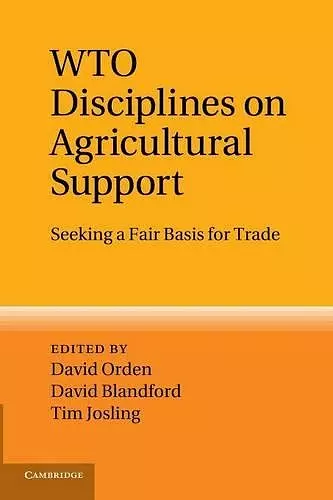WTO Disciplines on Agricultural Support
Seeking a Fair Basis for Trade
Tim Josling editor David Orden editor David Blandford editor
Format:Paperback
Publisher:Cambridge University Press
Published:19th Jun '14
Currently unavailable, and unfortunately no date known when it will be back

Developed and key developing countries heavily support their farmers. Can the WTO reduce the worldwide harm these unilateral policies cause?
Farm subsidies are controversial worldwide. Are trade-distorting subsidies of countries consistent with their legal obligations under the WTO? This in-depth analysis of eight key developed and developing countries examines loopholes in existing rules and assesses the potential for the negotiation of tighter constraints.Farm support is contentious in international negotiations. This in-depth assessment of the legal compliance and economic evaluation issues raised by the WTO Agreement on Agriculture presents consistent support data and forward-looking projections for eight developed and developing countries (EU, US, Japan, Norway, Brazil, China, India, Philippines), using original estimates where official notifications are not available. Variations over time in notified support in some cases reflect real policy changes; others merely reflect shifts in how countries represent their measures. The stalled Doha negotiations presage significantly tighter constraints for developed countries that provide the highest support, but loopholes will persist. Developing countries face fewer constraints and their trade-distorting farm support can rise. Pressure points and key remaining issues if a Doha agreement is reached are evaluated. Vigilant monitoring for compliance of farm support with WTO commitments will be required to lessen its negative consequences whether or not the Doha Round is concluded.
'We now need to build on the achievements of the Uruguay Round by completing the long overdue Doha Development Agenda. The authors of this study include experts who have played a leading role in the design of these disciplines. It is a formidable contribution to a subject of global importance.' Honorable Tim Groser, New Zealand Trade Minister and former Chair of the Doha Agriculture Negotiations
'This book deserves great praise. It answers almost all the pertinent questions raised in the international context of domestic support and is a clear reference for negotiators, experts, researchers, lawyers, politicians and other readers.' Franz Fischler, former Commissioner for Agriculture, European Union
'This excellent book provides a bright torch with which to examine existing and proposed disciplines. It is essential reading for those who wish to understand the domestic support issues in the current round of negotiations.' Joseph W. Glauber, Chief Economist, US Department of Agriculture and former US Special Doha Agricultural Envoy
'Finally a group of authors has had the courage and stamina to provide us with a systematic analysis of how major countries deal with the WTO disciplines on farm support. No longer do we need to rely on fragmentary information. This is a book for which we have waited eagerly.' Stefan Tangermann, former OECD Director for Trade and Agriculture
'The country-specific analysis allows academics and practitioners to get the real picture behind the notifications. Policymakers around the world now have an informed choice between undoing the Uruguay Round accomplishments and progressive self-reform based on international trade rules.' Christian Häberli, former Chair of the WTO Committee on Agriculture
'An excellent contribution to the literature on agricultural policy and trade and a remarkable input to encourage and promote the WTO agricultural negotiations to agreement.' Masayoshi Honma, University of Tokyo
'Governments, non-governmental organisations, researchers and journalists need measures to compare the levels and types of support to agriculture across countries. All these … should find this book extremely useful, and I wholeheartedly recommend it to colleagues and students.' Luca Salvatici, European Review of Agricultural Economics
'At its core, this book makes a compelling argument for the value of transparency … By reading this book, students, researchers, and policy practitioners will gain a deeper appreciation of the role of transparency and will be more sophisticated consumers of WTO notified information in the future.' World Trade Review
ISBN: 9781107417106
Dimensions: 229mm x 152mm x 27mm
Weight: 690g
520 pages